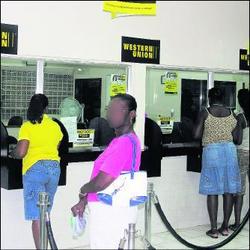Tyrone Reid, Enterprise Reporter

Patrons at a Western Union outlet, one of the premium agencies to collect money sent from overseas. Remittances to the island have been good, but the family unit has been adversely affected because of absentee parents. - File
Today, we launch our POSITIVE Parenting feature, a platform for national discussion on issues affecting parenting and the family. We hope, through this medium, to effect a reversal of the negative trends that have resulted in poor parenting, dysfunctional families, the breakdown in law and order and a debilitating society.
Some of our stories will reflect the negative state of parenting in the country, but our goal is to get qualified persons to offer solutions and because you, dear readers, are our partners in this drive, we invite your participation. Let us, together, find the solutions and bring about POSITIVE Parenting.
Email: phyllis.thomas@gleanerjm.com
JAMAICA'S CHILDREN are paying a hefty price despite the high levels of remittances the country has seen over the years, as local family life continues to reel under the effects of migration.
While remittances have a positive financial impact on the economy, sometimes the means to that end rupture the fibres of family life.
According to the 2007 edition of the Economic and Social Survey (Jamaica), remittances - the leading source of foreign currency inflows to the country - positively influence welfare and poverty reduction. At the same time, they have negatively impacted the family unit and the working-age population.
Mass exodus by mothers
Esther Tyson, principal of Ardenne High School in St Andrew, said in addition to the long-standing issue of paternal absenteeism, a growing number of mothers have joined the mass exodus in search of better economic opportunities.
Tyson said many parents migrate illegally and are not able to return to perform their parental functions. As a result, psychological pressures shape children's lives, often leaving them with a legacy of rage.
"A lot of anger is being played out by these students who have been abandoned by their parents," she said.
Tyson believes that the phenomenon of desertion in Jamaica must be addressed. Her administration, she reveals, has been forced to find homes for girls who were being abused because their mothers had migrated in search of work.
"I'm tired of it," she said. While the abuse is usually physical, Tyson added that there were some cases of sexual abuse.


( L - R ) Tyson, Clarke
Children's Advocate Mary Clarke questioned whether the foreign exchange earned via remittances from the exportation of especially women-dominated professional services was a reasonable price to pay for the damage being done to Jamaican families.
She said many of the people, like teachers and nurses, who leave Jamaica, are heads of households. "We need a balance and we need to make sure that whoever is migrating has made adequate provision for the care, protection and supervision of the children," she said.
"We can't always think in terms of money. We have to think of the social and psychological consequences," Clarke explained.
In a Sunday Gleaner report in April 2006, chairman of the Early Childhood Commission, Professor Maureen Samms-Vaughan, noted that there were consequences for changes in the family structure during childhood.
Clarke said extensive research was being done on the issue and revealed that a lecturer from the University of the West Indies has found that separation was difficult for both mother and child.
Quoting from research paper, Clarke said: "For the child who is left at an early age, the memory of the parent fades. The child who is left at the latest stage experiences fear, anger, resentment (and) rejection."
The Economic and Social Survey, which is published by the Planning Institute of Jamaica, also implied that the benefits and problems which accrue from the double-edged phenomenon could continue.
"The selective recruitment of Jamaicans by agencies in receiving countries, particularly of skilled human resources, is expected to remain high," the report said.
The report classified international migration as a major development issue that posed opportunities and challenges to all countries, including Jamaica.
It also said that the relevant authorities know about the downside to remittances.
"Decision makers are aware of the challenges which are to be addressed, and there is a need for strategies to be developed to deal with the negative impact," read another section of the report.
tyrone.reid@gleanerjm.com

|
MAINSTREAMS
OF MIGRATION FROM JAMAICA, 1996-2007
|
|
YEAR
|
USA
|
CANADA
|
UK
|
TOTAL
|
|
1996
|
19,
084
|
3,
278
|
262
|
22,
624
|
|
1997
|
17,
833
|
2,
835
|
260
|
20,
928
|
|
1998
|
15,
123
|
2,
235
|
325
|
17,
683
|
|
1999
|
14,
693
|
2,
346
|
307
|
17,
346
|
|
2000
|
15,
949
|
2,
462
|
287
|
18,
698
|
|
2001
|
15,
322
|
2,
775
|
346
|
18,
443
|
|
2002
|
14,
835
|
2,
457
|
408
|
17,
700
|
|
2003
|
13,
347
|
1,
983
|
479
|
15,
809
|
|
2004
|
14,
430
|
2,
131
|
500
|
17,
060
|
|
2005
|
18,
346
|
1,
880
|
374
|
20,
600
|
|
2006
|
24,
976
|
1,
686
|
520
|
27,
182
|
|
2007
|
26,
628
|
1,
646
|
534
|
28,
808
|
| Source:
Economic and Social Survey Jamaica 2007 |

